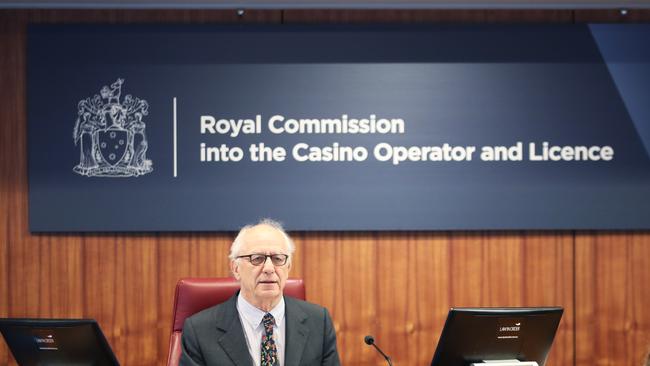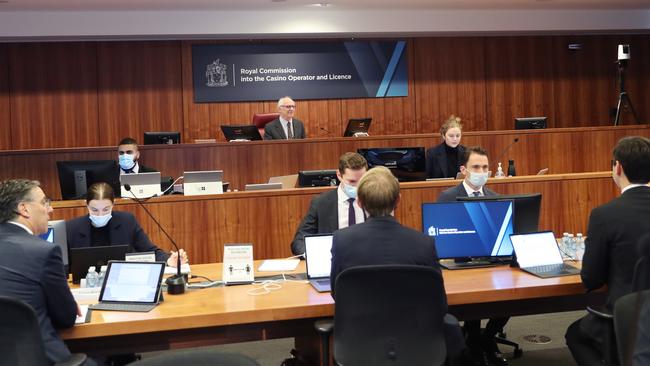Crown Resorts ‘worst case scenario’ included $200m dividend next year
Despite its casinos coming under fire, Crown Resorts still expected to return to dividends quickly, a royal commission has heard.

Crown Resorts planned to pay a $200m dividend as early as next year even under a “worst case” scenario as Covid-19, compliance costs and uncertainties around its casino licences weighed on its finances.
The move, which would result in the company’s estranged but still major shareholder James Packer receiving about $74m for his stake of about 37 per cent, was modelled as Crown stepped closer to an expected statutory loss in the 2021 financial year.
The dividend assumption was contained in a report produced by UBS in February, it was revealed at the final public hearing of the Victorian royal commission into Crown Resorts on Friday.
McGrathNicol partner Robyn McKern, who was retained by the commission to conduct an independent review into Crown’s anti-money-laundering systems, highlighted the figure in contrast to the extra money the casino group was investing in the team of its new head of compliance and financial crimes.
“[Financial crimes officer Steven] Blackburn’s plan’s been endorsed by the board so that has something like $21m of headcount included, which has already been effectively committed, that would be on an annual basis,” Ms McKern said.
“But just to contextualise, even that $20m cost, Crown’s worst-case scenario – looking at a paper that UBS produced back in February – when they were trying to figure out what the position, the financial position might be, they were forecasting a dividend of $200m next year.” February last year was an eventful month for Crown.
The NSW Bergin inquiry ruled it was temporarily unsuitable to operate its Sydney casino, leading to royal commissions in Western Australia and Victoria being called weeks later to investigate Crown’s suitability to operate their casinos in those jurisdictions.

It is not known if the UBS report encapsulates the financial impacts of the commissions.
Crown Resorts has told the Victorian government it is at risk of defaulting on almost $1bn worth of debt, and a heavy blow to the state’s broader coronavirus-battered tourism industry, if extreme adverse findings are made against it by the state’s royal commission into the company.
Meanwhile, on Monday Crown told shareholders it expected a statutory loss for the 2020-21 financial year due to growing regulatory compliance costs and the costs of rolling Covid shutdowns – despite being the recipient of hundreds of millions of dollars in Jobkeeper wage-subsidy payments.
Crown was one of the biggest recipients of the Morrison’s government’s coronavirus-busting JobKeeper scheme, receiving $146m.
The commission also heard on Friday that McGrathNicol had identified potential money-laundering activity in Crown’s DAB accounts, which record the credit and transactions of patrons, as late as June.
Counsel assisting Meg O’Sullivan said the firm’s report identified 1914 potential instances of structuring, a common method of laundering money, between January 2019 and last month.
Ms O’Sullivan also said the report indicated another type of money-laundering activity called “parking” in Crown’s customer safekeeping accounts. But she also noted that the report was not in any way conclusive. Ms McKern said the report did not reach the conclusion that structuring actually occurred.
Crucially for Crown, Ms O’Sullivan said the report “did not identify any transactions indicative of structuring on Crown’s patron accounts”, which have been the source of past controversy at the commission.
The report also contained employee evidence that indicated that Crown’s new anti-money-laundering (AML) controls were costing the company revenue.
The employees reportedly said two out of three patrons asked to fill out a source-of-funds declaration when betting over $25,000 declined to do so.
Ms McKern said the tension between regulatory compliance and profit could be an issue for Crown in the future
“There is a tension between some of these controls and ongoing gaming as it used to be and that is what the crux of what needs to be managed with strong leadership and commitment,” she said.
This view was echoed later in the day by Kiel Advisory Group managing director Elizabeth Arzadon, a corporate psychologist who was retained by the commission to provide a report that looked at aspects of Crown’s corporate culture.
“I do agree that (Crown’s cultural) change is possible but having observed a number of attempted culture changes in large organisations, there is a common pitfall … there needs to be some kind of reconciliation between the primary profit motive of any listed company and the conduct and compliance obligations,” she said.
Ms Arzadon said compliance functions had to be aligned with its revenue-generating side, but commissioner Raymond Finkelstein questioned if this was possible in Crown’s case. “What happens if that model doesn’t easily fit with the nature of the business … ie, a casino,” Mr Finkelstein said.
“You’re going to cause harm to some people come what may, I mean – that’s just the nature of the beast.”
“That is why you have regulators. You have to have regulators to control that natural inherent drive,” Ms Arzadon replied.
“You should assume I’m a firm believer in heavy-handed regulation, for a long time,” Mr Finkelstein replied.
The commission will hear closing commissions from counsel assisting on July 19.
It will report to the Victorian government by October 15.




